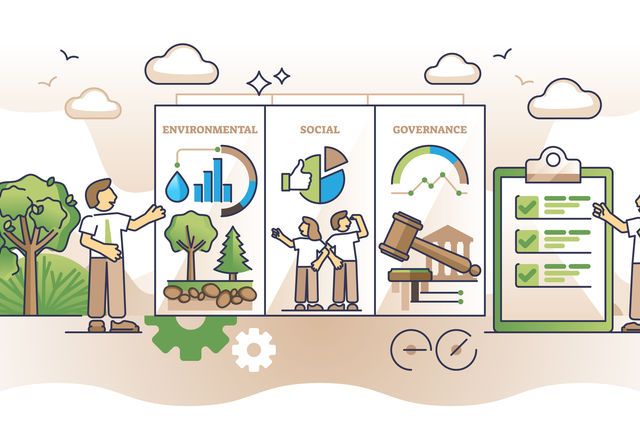How to incorporate the S in ESG reporting: materiality, metrics and creating momentum
15 experts shared their view
Guest contributor: Anke Winchenbach, PhD, Senior Lecturer at the School of Hospitality and Tourism Management, University of Surrey.
Environmental, social, and governance (ESG) criteria are increasingly guiding business strategy, operations, and reporting. The new European Sustainability Reporting Standards (ESRS) and related Corporate Sustainability Reporting Directive (CSRD)[1] apply a phased approach[2] which eventually requires all large and listed companies operating in the EU to disclose risks and opportunities related to environmental and social issues, and the impact their activities have on people and the planet.
While there has been considerable progress in assessing and reporting on environmental and governance components of ESG, social sustainability aspects have received considerably less attention, with reporting against social criteria remaining patchy and difficult to compare[3]. Social is also the part that seems to be influencing ESG investment the least, and yet, from an investment risk point of view, it's important, especially when considering the current challenges in retaining and recruiting staff (e.g. 61% of businesses are experiencing staff shortages in the UK alone, resulting in reduced trading hours[4]). Further, the hospitality industry frequently considers workers as their key assets, yet concerns over insecure, indecent, and undignified work, and human rights violations remain[5,6].
Given the changes in the sustainability regulatory landscape in the EU and beyond, and the context above, the following questions arise:
- Which social aspects should companies measure and report against, what metrics should be used?
- What are the main barriers assessing social sustainability and how can they be overcome?
References
[1] https://finance.ec.europa.eu/capital-markets-union-and-financial-markets/company-reporting-and-auditing/company-reporting/corporate-sustainability-reporting_en
[2] For details see page 63, article 5 section 2 a) and b) here: CELEX:32 022L2464" target="_blank">https://eur-lex.europa.eu/legal-content/EN/TXT/PDF/?uri=CELEX:32 022L2464 and https://ec.europa.eu/commission/presscorner/detail/en/qanda_23_4043
[3] Guix, M., Bonilla-Priego, M. J., & Font, X. (2018). The process of sustainability reporting in international hotel groups: An analysis of stakeholder inclusiveness, materiality and responsiveness. Journal of Sustainable Tourism, 26(7), 1063-1084.
[4] https://www.ukhospitality.org.uk/worker-shortage-fix-needed-if-hospitalitys-world-cup-boost-to-continue/#:~:text=Leading%20hospitality%20trade%20bodies%20have,and%20days%20as%20a%20result.
[5] Ladkin, A., Mooney, S., Solnet, D., Baum, T., Robinson, R., & Yan, H. (2023). A review of research into tourism work and employment: Launching the annals of tourism research curated collection on tourism work and employment. Annals of Tourism Research, 100, 103554.
[6]Winchenbach, A., Hanna, P., & Miller, G. (2019). Rethinking decent work: The value of dignity in tourism employment. Journal of Sustainable Tourism, 27(7), 1026-1043.
When it comes to incorporating the social aspect in ESG reporting, prioritising the well-being and investment of staff members is paramount. Companies should focus on revaluing their workforce by allocating resources towards training, retention strategies, and ensuring fair compensation.
However, several barriers hinder the effective assessment of social sustainability. One major obstacle is the reluctance of companies to disclose information, particularly regarding their transparent treatment of employees. Staff development and welfare investments are often deprioritised in favour of short-term financial gains or infrastructure projects. Additionally, there is a tendency to view staff members solely as expendable resources, leading to their neglect during times of crisis.
To overcome these barriers, companies must shift their mindset towards viewing their employees as invaluable assets and invest in their future. This entails promoting fair wages, providing opportunities for skill development, and fostering a supportive work culture. Furthermore, enhancing transparency and accountability in reporting practices is essential for stakeholders to assess a company's social sustainability performance accurately.
By addressing the barriers and investing in human resources, companies can create a more resilient and socially responsible business model that aligns with ESG principles.
Companies should be measuring the holistic well-being of all stakeholders. This typically includes assessing and monitoring employees, local communities, customers, and suppliers. Holistic well-being can be measured through six domains, as recommended by the comprehensive "Well-Being Assessment" (WBA), namely: Emotional Health, Physical Health, Meaning and Purpose, Character Strengths, Social Connectedness and Financial Security. The World Health Organisation's definition of health goes beyond mental and physical health to include the wholeness of a person. Social metrics in the EU are being standardized through the EU Social Taxonomy, a new social reporting tool that will potentially allow organisations to report against decent work, adequate living standards and inclusive and sustainable communities and societies. Companies can also report Social Sustainability against universally recognized protocol such as the UN Guiding Principles on Business & Human Rights or UNSDGs, or well-being indices such as the Happy Planet Index, the World Happiness Report, Global Happiness and Well-Being Policy Report or the OECD's Well-being framework. For an organization to effectively measure social sustainability and social impact, stakeholders must be engaged and incentivized to provide regular, credible input.
Related article by Chalana Perera
With many ESG platforms and no one set of standards, the field is messy. The already accepted standards for hospitality included in the GSTC Criteria for Hotels and Accommodations are always a good place to start ensuring that the criteria covered in sections B (social benefits to communities) and C (cultural heritage) are included and that the UN SDGs are aligned. The IFRS and its International Sustainability Standards Board (ISSB) have merged with SASB providing a set of metrics for hotels, but the S is scanty and not as robust as some other platforms that follow ESG such as B Corps. Top priorities for Social standards that are seen across platforms (including GRI) should always include diversity, accessibility, employee engagement, social contributions, local support, gender pay gaps, living wages, and human rights. These can be measured and reported and have been for some time now. Hindering these efforts are policies being implemented in some states causing a diversion away from ESG, especially the S. We forge on and continue to educate about ESG reporting and how to harmonize the platforms and metrics and make this a seamless part of running any hospitality business by training the future generation.
Measuring the impact of social sustainability initiatives is less straightforward than environmental ones, but starting with internal HR policies and outcomes such as diversity, inclusivity, gender pay gaps, staff turnover, living wages will provide datapoints which can be measured, audited and reported on. Staff satisfaction surveys can provide additional datapoints (albeit more subjective) which help to evaluate business performance.
External social initiatives, such as charitable and community engagement can also be measured, either in terms of paid staff hours used for volunteer work, money donated, or in-kind donations to community organisations (meals, room nights, use of facilities, sponsorship of local organisations, etc.). The social value of these initiatives is more subjective, but having policies in place to promote social and community engagement is good for team building and allows hospitality businesses to strengthen links to the communities in which they operate.
The main barrier in assessing social sustainability is getting the commitment of business owners to invest the time, money and people required to establish policies, evaluate opportunities and record and review outcomes. Resources like Weeva give owners tools to manage the process. Certifications such as B-Corp also provide frameworks for social sustainability.
There are numerous social aspects of tourism businesses that can be measured, including:
- Percentage of local staff
- Percentage of locally produced/purchased goods or services
- Availability of spaces and services that are adapted to people with disabilities (impaired, blind, using wheelchairs etc.)
- Establishment of employee, labour and human rights policies, including child protection policies
- Having a hiring policy in place that supports recruitment of those from disadvantaged backgrounds
- Availability of staff benefits, such as healthcare, insurance, maternity benefits, over-time compensation, education and training
- Quality of living standards for staff that live on site
- Contribution to local projects supporting disadvantaged people, education, cultural heritage etc.
- Encouraging guests/clients to support local projects/initiatives
The above socially responsible criteria are taken from the Hotel Resilient Advanced Sustainable Audit. We've found that more and more tour operators are demanding transparency on these issues from the hotels they work with. The Corporate Sustainability Reporting Directive (CSRD) will only increase this demand. Technical solutions to aid tourism businesses to measure social impact are available, but a challenge will be to overcome cultural and organizational resistance to change in reporting (or lack thereof) practices.
Employees are a core part of the social aspect of ESG, but the aspect goes far beyond them. Social impact of a business on local communities, suppliers, NGOs, and regions must also be evaluated. For example, in cases where hotels partner with NGOs that focus on environmental or social causes, the social influence of the hotel can extend itself into invigorating the work of such entities.
I believe that a lack of clear and transparent metrics is an important limitation for the social side of ESG. Environmental aspects have measures that are easy to report, understand, and compare, even if their underlying definitions can cause confusion (e.g., net zero and its different scopes). In essence, they make for great reporting material that people can relate to. Traditional employee satisfaction measures can also be easily reported (e.g., rotation, satisfaction), but they are a measure of whether employees are managed well rather than signify the true responsibility of an employer. Effective social impact measurement is complicated, and companies tend to report what they like, leading to a smorgasbord of indicators. Thorough research into when social (non-environmental) initiatives are impactful and measurable must be conducted to develop meaningful measures for industry to use.
The main barrier to assessing the social aspect of ESG reporting is to first bring its importance in line with environmental sustainability. A recent study asked hotel guests to rate a list of circular economy practices based on a) their willingness to pay, b) their importance, and c) their intention to reserve a stay.¹ The results are extremely valuable for business owners when deciding how to combine environmental sustainability investments with enhanced guest satisfaction. It would be an interesting experiment to apply this survey to examples of social sustainability practices. Given that the top result from the study is linked to guest comfort, a further question arises: Could we create guest experience KPIs from social sustainability practices?
Meanwhile, two immediate metrics to assist in reporting on social sustainability are employee turnover rate, and satisfaction/mood surveys.
With 86% of employees quoting that having "meaning" in their work is more important than ever before,² these metrics can open dialogue not only around enhanced labour practices that embrace diversity and inclusion, but also around co-defining social purpose by co-electing the right community initiatives that will have the most positive impact and increase employee "feel-good factor".¹ https://hospitalityinsights.ehl.edu/best-circular-economy-practices-hotels
² https://sustainablebrands.com/read/organizational-change/study-employees-demanding-more-meaning-from-their-work-than-pre-pandemic
There are several factors and variables to consider in reporting about social sustainability.
For example, VIRTU Resorts is currently focusing on measuring culture and well-being, extending to include Indigenous knowledge. VIRTU's enriched business practices are rooted in the holistic connections between communities and the environment paired with the latest in technology. We are exploring ways to measure effective hiring practices with Indigenous human resources managers: fair remuneration, unique skill development, job satisfaction, health and wellness, housing support systems, mentorship between youth and elders, and work/life balance. VIRTU's assessment involves tracking turnover rates, wage structures, learning initiatives, managerial effectiveness, and feedback mechanisms that can be easily shared.
When engaging with Indigenous groups, upholding cultural protocols goes beyond formality."Social" sustainability evaluation often encounters hurdles if you are not prepared for diverse stakeholder expectations, data complexities, and unique cultural aspects that vary per region. Overcoming these challenges calls for a strategic approach, emphasizing transparent and consistent communication, collaboration with stakeholders, efficient reporting, and ongoing refinement.
Navigating options ensures alignment with the right company to work with for a unique hospitality model. Diligent adherence enables organizations to forge meaningful partnerships, fostering a collaborative and mutually beneficial approach to social sustainability initiatives.
Coming from the the Sustainable Hospitality Alliance and the Net Positive Hospitality approach, it's crucial that companies measure and report on a variety of social aspects. These include, but are not limited to, employee health and wellbeing, fair and equitable wages, diversity and inclusion, and human rights adherence. To ensure consistency and comparability, reports should utilize internationally recognized standards and frameworks.
The main barriers assessing social sustainability are often linked to intangibility and subjectivity of social impacts, lack of standardized metrics, and the complexity of compiling data across different departments and locations. Overcoming these hurdles requires a comprehensive approach. Businesses should implement robust data collection and monitoring systems and foster a culture of transparency and accountability. Education and training programs can ensure that all stakeholders understand the importance of social sustainability and their role in it.
With Net Positive Hospitality, businesses should aim to create a positive social impact, not just minimize negative ones. They should engage with local communities, invest in their employees' development and wellbeing, and promote a more inclusive and equitable hospitality industry. By doing so, companies will not only meet regulatory requirements but also enhance their reputation, attract and retain talent, and ultimately drive long-term value.
Related article by Glenn Mandziuk
At the moment, there seems to be a high degree of demand from mission-critical entities (banks, investment funds, venture capitalists) putting pressure on those entities in need of funding (startups, scaleups, shareholding based corporations), hence the opportunity will be there, to translate such funding and banking demands into a truly intellectually sustainable platform, possibly enabling a deeper transition towards preferable futures. Learning from practice and transferring such learnings into standards by means of valorization, publication and dissemination will be key.
Related article by Marco Bevolo
Indeed, the social indicators and metrics are often the most challenging ones, but they are very decisive in the way forward. For me the social aspects even determine the environmental and economical performances. Especially in the tourism we have a strong focus on the guest experience and less focus on the employee satisfaction and well-being. But how can an unsatisfied and stressed employee ensure a professional service?
I strongly believe, that we need to turn the focus towards our relationship quality with the stakeholders that are most responsible for a successful touristic product: the employees, the suppliers and the residents. Therefore, employee satisfaction and well-being, co-creation activities with local suppliers to design authentic experiences as well as including residents needs in a touristic product are key indicators to develop and follow up on.
What is even harder to evaluate, but might be the best way forward, is to measure attitudes and values. As any outer activity depend on our inner will and awareness, measuring capacity building and educational activities to support this transformation, are crucial as well.
When we start reporting about social aspects, we're telling the world that we've not been good until now in how we've handled these aspects. A truth which is sometimes tough (and risky) to admit publicly. And yet, gaining trust and being able to attract and retain talents again, requires to go through this incomfortable phase in order to collectively reach a new hospitality era.
Social metrics which could (should?) be developed include:
- Regarding staff: ratio of physical vs intellectual work, number and type of employee litigations, mental and physical health index, corporate democracy index, GM/CEO-to-worker pay ratio, guest-value-creation ratio...
- Regarding external stakeholders: social value created and significance of litigations with local communities, type and quality of partnerships with local non-profits, mental health of staff relatives...
The main barriers to overcome to be able to assess social sustainability are related to
- the complexity of measuring these aspects - a barrier that new technologies can help us overcome
- a fear of facing what these ratios will tell about some of our worst habits - a barrier that we need to overcome collectively by supporting each other in the industry, and beyond.
There is a misconception that we can separate ESG issues. In reality, every environmental action carries social implications, and vice versa. And we should be able to measure and monitor this intersectionality and the performance of the hotel's impact in that regard. Social aspects that hotels should measure and report on range from conducting Human Rights due diligence to assessing supplier labor conditions. The extensive range of topics covered in frameworks such as the GRI or European regulations- the CSRD regulation introduces over a thousand KPIs for companies to report on - ensures that the scope extends beyond merely discussing D&I programs. Regarding metrics, the UNSDPIs provide a robust tool for measuring progress. However, several barriers hinder the assessment of social sustainability. These include challenges such as data availability, quantity, and quality, subjectivity among executives when conducting materiality assessments and incorporating stakeholder perspectives, resource constraints—particularly in SMEs, which constitute the majority of the industry—and resistance to change in hierarchical structures. These issues can be overcome through diligent data collection, leveraging technology for transparency and collaboration with local entities, alongside educational initiatives and a firm commitment to continuous improvement.
The promise of business is to increase the general well-being of humankind through service, creative invention and ethical philosophy– Paul Hawken in The Ecology of CommerceI will use this quote which serves as a good basis to understand the social element of doing business (and eventually derive metrics that matters):
The first part is about ‘general well-being’ and this is about quality of life, with factors such as health, education, social security, equality and social cohesion and poverty reduction and using businesses as way to improve those aspects (and not deteriorate them)
The second part is ‘through service’ which indicates the role of businesses in enhancing quality of life and extending this into offering fair job opportunities, ensuring safe and just working conditions and investing in local communities.
The third part refers to ‘creative invention’ which, in a socially responsible contex, encompasses products or services that are accessible, affordable, reduce environmental harm, address health issues, improve education or positively transform the users.
And then, at last, the ‘ethical philosophy’ which implies a set of moral values that would incorporate respect for human rights, equality and diversity, honesty and transparency, and a commitment to fair practices for example.
One could also translate this into obvious large categories which includes labour practices (within my four walls), human rights (beyond my four walls, upstream and downstream), society at large (my community and current/future generation) as well as product responsibility (my consumers).
It is worth to review the European Sustainability Reporting Standards (ESRS) sets of disclosure requirements (and metrics) for the large players including the 4 cross-cutting, agnostic Social Standards on ESRS S1 Own Workforce; ESRS S2 Workers in the Value chain; ESRS S3 Affected communities and; ESRS S4 Consumers and end users – scroll down the page for the PDFs: https://www.efrag.org/lab6.
For a hospitality business, it is essential to prioritize attracting and growing talent. This can only be achieved with a clear focus on the S of ESG. Social sustainability empowers team members to grow and develop meaningful careers. Key material topics which hospitality companies are assessed on include labour and human rights protection, training and development, acquisition, team member engagement, equity, diversity, and inclusion, sustainable sourcing, and business ethics.
Unlike environmental sustainability levers, none of these crucial criteria can be offset or compensated elsewhere. Instead, it is key to create positive ‘handprints’ and break down barriers wherever possible, using tangible quantitative and qualitative data to measure and highlight the progress made.
One such example is human rights reporting aligned with the Modern Slavery Act, which has resulted in companies confirming their commitment to preventing and combatting slavery and human trafficking. This year, some businesses will be producing their 8th statement which will highlight significant improvements in both the quantitative and qualitative data in comparison to the first statements dating back in 2016.
















